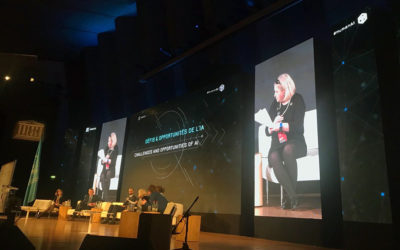Further Reading and Resources:
- Blockchain Applications in the Public Sector.
- Palfreyman, J. (2017, February 1) Blockchain for government: Building trust, Demolishing Bureaucracy. (IBM): IBM Blockchain Blog.
- O’Reilly, T. (2013) Open Data and Algorithmic Regulation. In Goldstein, B. and Dyson, L. (eds.) Beyond Transparency: Open Data and the Future of Civic Innovation.
- Rockwell, M. (2017) BitCongress—Process For Blockchain Voting & Law.
Blockchain Technologies
Blockchain Technologies were developed to underpin digital currency by securing, validating and processing transactional data. Such elements of Blockchain technology, which were conceived initially for Bitcoin, are now recognised to have far-reaching potential in other areas, especially for government. The core technologies are:
Distributed Ledger Technology (DLT) — a decentralised database where transactions are kept in a shared, replicated, synchronised, distributed book-keeping record, which is secured by cryptographic sealing. The critical distinction between ‘distributed ledgers’ and ‘distributed databases’ is that nodes of the distributed ledger cannot/do not trust other nodes—and so must independently verify transactions before applying them.
Smart Contracts — these are the rules, possibly computer programs, that attempt to codify transactions and contracts with the intent that the records managed by the distributed ledger are authoritative for the existence, status and evolution of the underlying legal agreements they represent. Smart contract technology can automate transactions, such as supply chains, and have the potential to automate laws and statutes.
Governments are increasingly launching projects that apply Blockchain technologies to transform regulatory compliance, contract management, identity management and government records. Other potential uses in facilitating elections and direct democracy models are also being discussed and developed.
Related Papers and Publications

Algorithmic Government - The Computer Journal
Paper #02
Paper #03
Paper #03

Next GovTechLab Event
Latest News
Dr. Catherine Mulligan: UNESCO Humanistic AI Conference (Paris, March 2019)
Dr. Catherine Mulligan (CTO, GovTech Lab) blogs about chairing a panel at the UNESCO Humanistic AI Conference (Paris, March 2019). This week (4 March 2019) I attended and moderated a session at the UNESCO Humanistic AI conference that was held in Paris, on the first...
read moreConference Announcement: Data for Policy 2019 – June 10-12 (University College London)
The forthcoming Data for Policy Conference will be hosted at University College London, on the 10-12thJune (dataforpolicy.org). The conference series is led by GovTech Lab’s founder and principal investigator Dr Zeynep Engin, and this year will address two...
read moreGovTechLab Event 25th Jan 2019: Government Innovation
On the 25th of January (2019), a GovTechLab Knowledge Transfer Consortium event was held at UCL, which focused on the theme of ‘Government Innovation’. The event was chaired by Prof. Philip Treleaven (UCL), who started proceedings with an introduction to the event’s...
read more



